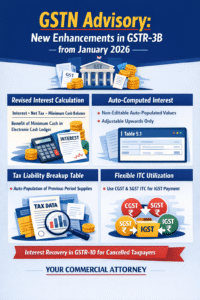In a significant move towards harmonizing GST practices, the Government of India, through the GST Policy Wing of the Ministry of Finance, has issued Circular No. 243/37/2024-GST dated December 31, 2024. This circular provides vital clarifications on the GST treatment of vouchers, addressing ambiguities that have led to disputes and inconsistencies.
Key Issues Addressed in the Circular:
- Classification of Vouchers: The circular delves into whether transactions involving vouchers constitute the supply of goods or services under the Central Goods and Services Tax (CGST) Act, 2017. It categorizes vouchers as instruments that impose an obligation on suppliers to accept them as consideration for goods or services. Depending on their classification, vouchers are treated either as money or actionable claims, neither of which qualifies as a supply of goods or services under GST.
- GST Implications for Voucher Distribution:
- Principal-to-Principal (P2P) Model: Distributors who purchase and resell vouchers autonomously are engaged in trading activities, which are not taxable under GST.
- Agency Model: Distributors acting as agents for voucher issuers are liable to pay GST on the commission or fees earned.
- Taxation of Additional Services: Services such as co-branding, marketing, or customer support provided alongside vouchers are subject to GST. The applicable rate depends on the nature of these services.
- Treatment of Unredeemed Vouchers (Breakage): The value of unredeemed vouchers does not attract GST as there is no underlying supply of goods or services. The circular reinforces this position by clarifying that amounts attributable to breakage are not considered as consideration under GST.
Detailed Explanations and Clarifications:
- Nature of Vouchers: Vouchers recognized by the Reserve Bank of India (RBI) as prepaid instruments are classified as “money” under the CGST Act. These instruments are exempt from GST on their transactions. Non-RBI-recognized vouchers, on the other hand, fall under “actionable claims” and are also exempt from GST, provided they are not related to specified actionable claims like betting or gambling.
- Taxability in Distribution Models:
- P2P Trading: Pure trading of vouchers, where distributors operate independently, does not qualify as a taxable supply.
- Agency Relationships: Any commission or fee earned by agents distributing vouchers is treated as a supply of services and taxed accordingly.
- Breakage Amounts: Unredeemed vouchers, often accounted for as income by businesses, are clarified to be outside the GST purview. The absence of a supply transaction for these vouchers means no taxable event has occurred.
Implications for Businesses:
This clarification provides a standardized framework for businesses dealing with vouchers, enabling them to:
- Streamline tax compliance and avoid disputes.
- Clearly distinguish between taxable and non-taxable voucher transactions.
- Understand the implications of unredeemed vouchers on their GST liability.
Final Note:
The government has urged all stakeholders to disseminate this information widely to ensure consistent interpretation and application of GST laws concerning vouchers. Businesses are encouraged to adapt their systems and practices to align with these clarifications, reducing the risk of litigation and compliance challenges. Click here for original circular




Add comment